Part 17: December 20 Broadcast

You are listening to BBC radio 4. In an hour, there will be a presentation on traditional celebrations over the history of Hanukah. For the next hour, Professor David Stephenson will be presenting a documentary on the second 80 years war of the eighteenth century. This series will be running every third day, up to 50 episodes. If you want news of the current war in the Middle East please channel in to BBC radio 1.
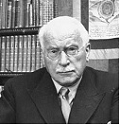 Good evening, and welcome to BBC radio 4. I’m Professor David Stephenson, professor of Dutch historical studies at Cambridge. This is the seventeenth part of our 50 episode special on the second 80 years war over Europe. Joining me for these broadcasts are fellow researchers and scholars Doctor Albert Andrews, specialist in German studies from the Berlin academy, Professor Robert Lowe, specialist in French studies at Cambridge, and a graduate student and technical assistant, Anton Thatcher. Last week, we reviewed the British invasion of Florida, the Dutch election preparations and the siege of Munich and Austria.
Good evening, and welcome to BBC radio 4. I’m Professor David Stephenson, professor of Dutch historical studies at Cambridge. This is the seventeenth part of our 50 episode special on the second 80 years war over Europe. Joining me for these broadcasts are fellow researchers and scholars Doctor Albert Andrews, specialist in German studies from the Berlin academy, Professor Robert Lowe, specialist in French studies at Cambridge, and a graduate student and technical assistant, Anton Thatcher. Last week, we reviewed the British invasion of Florida, the Dutch election preparations and the siege of Munich and Austria. By 1730, the Dutch had largely consolidated their position across most theaters, save the Americas where they were thrown into temporary disarray by the British flanking assault from sea on the fort at St. Augustine. Their emergency reinforcement and replenishment of armies in the Americas actually spiked their total government income to under twenty million guilders per annum for the first time in over a decade, but it put the Dutch in a strong position to repel the British and press further Northward. Stuck in around Vienna, the Dutch had lost their opportunity to quickly knock England out of the war through London after the British reinforced their local armies near Portsmouth.
By 1730, the Dutch had largely consolidated their position across most theaters, save the Americas where they were thrown into temporary disarray by the British flanking assault from sea on the fort at St. Augustine. Their emergency reinforcement and replenishment of armies in the Americas actually spiked their total government income to under twenty million guilders per annum for the first time in over a decade, but it put the Dutch in a strong position to repel the British and press further Northward. Stuck in around Vienna, the Dutch had lost their opportunity to quickly knock England out of the war through London after the British reinforced their local armies near Portsmouth.
The European Dutch were heavily concentrated around Austria.
 The Dutch were attacked first in Munich, where the Austrians had hoped to shatter the Dutch garrison before turning to lift the siege in Vienna. The Dutch by contrast had hoped the garrison in Munich would hold, chase down the survivors, and then reinforce them around Vienna. Otherwise, they would have to last through a long siege around Vienna, which could possibly be lifted by the garrison south of Vienna stationed in Croatia.
The Dutch were attacked first in Munich, where the Austrians had hoped to shatter the Dutch garrison before turning to lift the siege in Vienna. The Dutch by contrast had hoped the garrison in Munich would hold, chase down the survivors, and then reinforce them around Vienna. Otherwise, they would have to last through a long siege around Vienna, which could possibly be lifted by the garrison south of Vienna stationed in Croatia.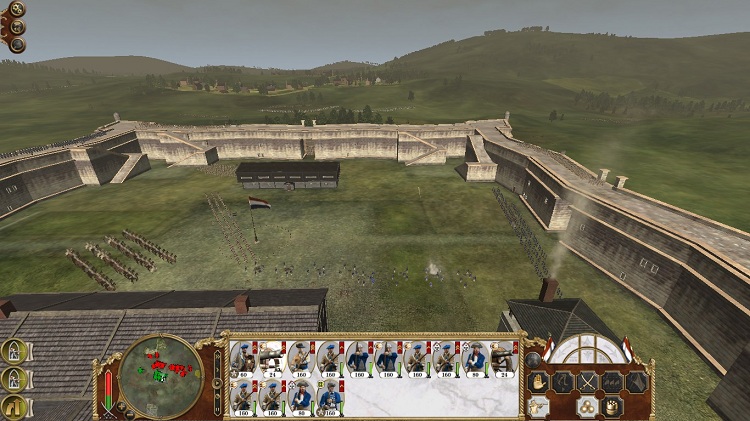
The Dutch are preparing to defend against the Austrian attack at Munich.
 The Dutch defense consisted of the now leaderless and relatively sponsor-less Dutch militia, a small group of professional cavalry from Amsterdam and several cannons. A battalion of Swiss line infantry was rushed to the theater, but was outside the walls when the assault started. The Dutch had actually noted the Austrians were using only a few light 6 pound cannon, which meant the Austrians would have to try to assault the walls.
The Dutch defense consisted of the now leaderless and relatively sponsor-less Dutch militia, a small group of professional cavalry from Amsterdam and several cannons. A battalion of Swiss line infantry was rushed to the theater, but was outside the walls when the assault started. The Dutch had actually noted the Austrians were using only a few light 6 pound cannon, which meant the Austrians would have to try to assault the walls.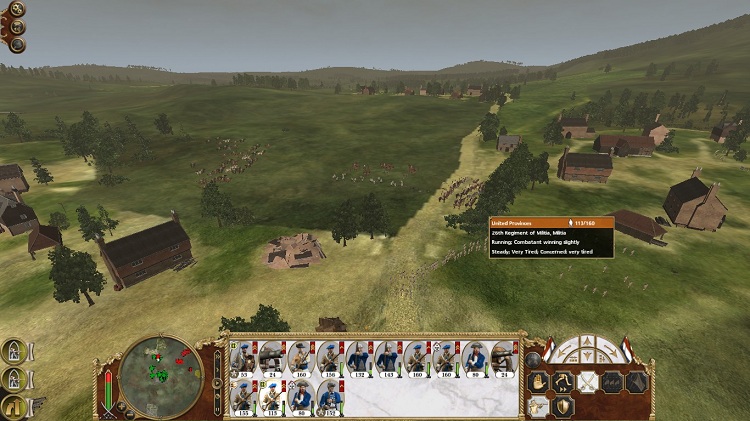
While the 6 pound cannon was mobile and could be used to rapidly get in an advantageous position, or flee a disadvantageous one, they were not well equipped to pummel fortification walls.
 Under normal circumstances, the Dutch would have vastly preferred the assailants having to clamor over their defenses to reach the inner keep, but in this particular assault, the Dutch didn’t have enough men to cover the entire extent of their walls, nor were the men they had along the walls trained extensively in the art of hand to hand combat. This meant they would need another strategy.
Under normal circumstances, the Dutch would have vastly preferred the assailants having to clamor over their defenses to reach the inner keep, but in this particular assault, the Dutch didn’t have enough men to cover the entire extent of their walls, nor were the men they had along the walls trained extensively in the art of hand to hand combat. This meant they would need another strategy.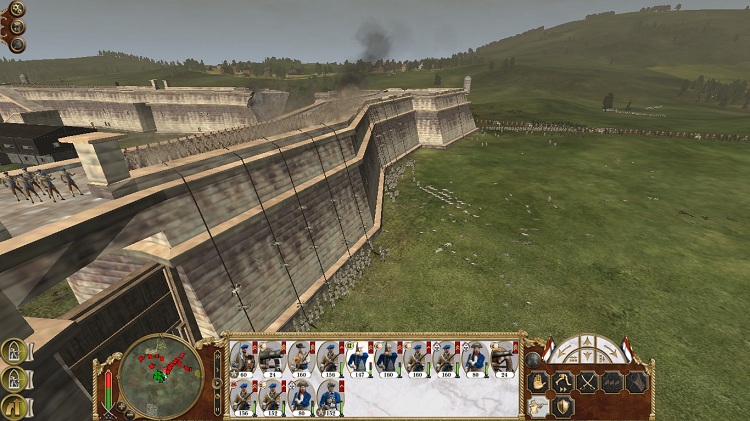
Dutch militia attempting to hold the Austrians from scaling their walls at the siege of Munich.
 Determining approximately where the Austrians would be firing their cannons, the Dutch sapped a portion of their own walls creating a narrow breach. Done under Austrian cannon fire, they had hoped the Austrians would simply take it as a defect in the wall that they had undone with light cannon fire. The breach was accurately and carefully lined by Dutch soldiers, but more importantly, had been ranged in for Grape shot from the heavy Dutch cannons.
Determining approximately where the Austrians would be firing their cannons, the Dutch sapped a portion of their own walls creating a narrow breach. Done under Austrian cannon fire, they had hoped the Austrians would simply take it as a defect in the wall that they had undone with light cannon fire. The breach was accurately and carefully lined by Dutch soldiers, but more importantly, had been ranged in for Grape shot from the heavy Dutch cannons.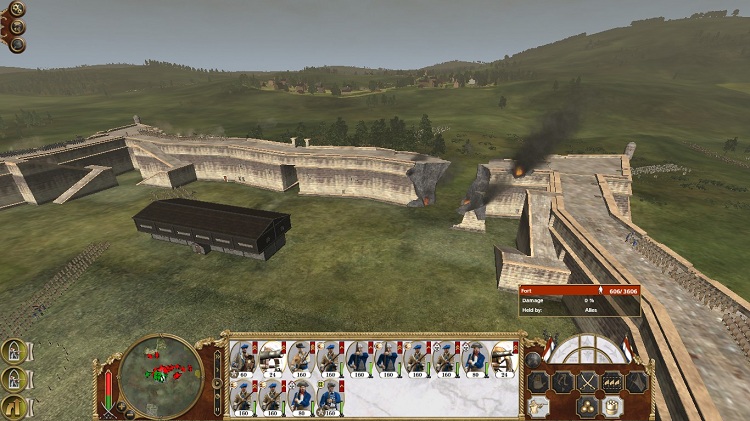
The Dutch collapse a section of their wall, hoping to funnel the Austrians into a well prepared kill zone.
 The Austrian army had at first tried to spread their assault across the sides of the fortress rather than committing their entire force into a suspicious breach. On the left, after taking fire from the walls, and failing to find an ungarrisoned point, the reinforcing Swiss line infantry trying to make it to the fortress gates interrupted the advancing Austrian skirmishers.
The Austrian army had at first tried to spread their assault across the sides of the fortress rather than committing their entire force into a suspicious breach. On the left, after taking fire from the walls, and failing to find an ungarrisoned point, the reinforcing Swiss line infantry trying to make it to the fortress gates interrupted the advancing Austrian skirmishers.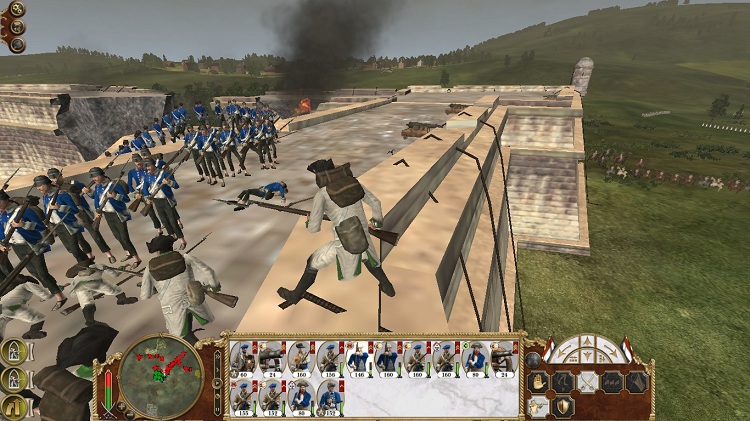
Dutch militia were forced to swarm Austrian line infantry that attempted to climb the walls. They could only win through sheer numbers.
 After their entire right had been taken apart by Dutch supporting fire and the Swiss infantry outside the fortress, the Austrians were willing to attempt a more desperate push into the central breach. The cannons already firing at the gap, and with infantry positioned to fire from the walls, buildings and courtyard into the breach, the Austrians were hit hard, with hundreds of casualties piling higher and higher in the gap.
After their entire right had been taken apart by Dutch supporting fire and the Swiss infantry outside the fortress, the Austrians were willing to attempt a more desperate push into the central breach. The cannons already firing at the gap, and with infantry positioned to fire from the walls, buildings and courtyard into the breach, the Austrians were hit hard, with hundreds of casualties piling higher and higher in the gap.
The Austrians try to rush the breach. Most are gunned down before they could make it 100 yards.
 Through the smoke and confusion, the Austrians behind the initial push didn’t know how poorly the situation was developing in the Dutch fort, and hundreds of them continued to press in through the breach. Men who cleared their way through the smoke were often killed before they could comprehend the situation, or how much fire they were under, with as many as three in every four men being killed within the first thirty seconds of passing through the breach. So many had been killed that the officers with the distant cavalry and artillery had assumed the push had been bogged down in melee, and that the indication of few men retreating back from the breach was a sign of success.
Through the smoke and confusion, the Austrians behind the initial push didn’t know how poorly the situation was developing in the Dutch fort, and hundreds of them continued to press in through the breach. Men who cleared their way through the smoke were often killed before they could comprehend the situation, or how much fire they were under, with as many as three in every four men being killed within the first thirty seconds of passing through the breach. So many had been killed that the officers with the distant cavalry and artillery had assumed the push had been bogged down in melee, and that the indication of few men retreating back from the breach was a sign of success.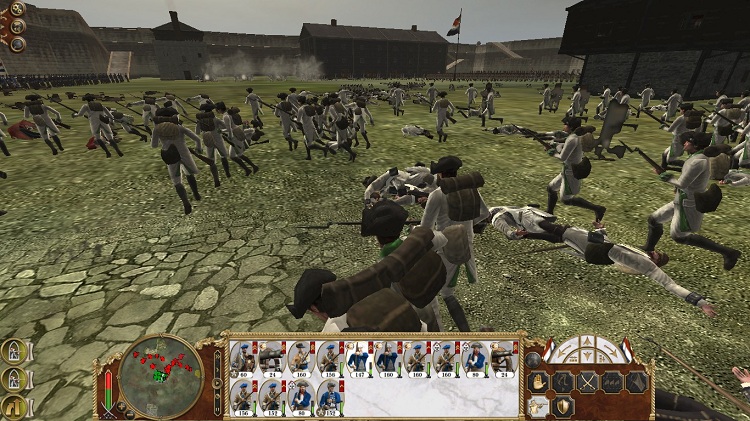
A view given by a survivor of the Austrian assault. The memory of the Dutch tearing into the Austrian line from their incredibly potent position seared itself into his mind.
 With the infantry almost entirely wiped out, the Dutch garrison was free to move forward to take apart the Austrian cavalry and artillery. Unsupported by a line of infantry, both were astonishingly vulnerable making the cleanup effort relatively painless.
With the infantry almost entirely wiped out, the Dutch garrison was free to move forward to take apart the Austrian cavalry and artillery. Unsupported by a line of infantry, both were astonishingly vulnerable making the cleanup effort relatively painless.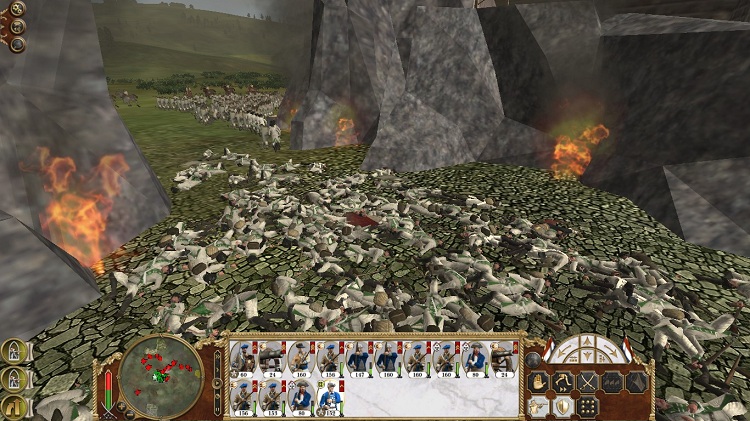
The infantry were piled high in the gap, dead by the thousands. The few survivors barely escaped with their lives, leaving the cannon vulnerable.
 The Dutch garrison having repelled the Austrians sallied forth to run down the remnants that had retreated almost to Saxony. The army consisting of a few grenadiers that had been tasked on taking the Dutch walls and were repelled by chronic fire, a few survivors from the hell in the breach, and a small section of cavalry was far too ragged to oppose the Dutch force, freeing the militia to reinforce the siege of Austria.
The Dutch garrison having repelled the Austrians sallied forth to run down the remnants that had retreated almost to Saxony. The army consisting of a few grenadiers that had been tasked on taking the Dutch walls and were repelled by chronic fire, a few survivors from the hell in the breach, and a small section of cavalry was far too ragged to oppose the Dutch force, freeing the militia to reinforce the siege of Austria. It was during that month that the elections were finally held, just prior to the attack on Vienna. The Dutch Republicans stepped down from office after their two terms and let their younger colleagues attempt to gain the presidency. They had spent some time grooming their replacements, but the lesson they had learned a decade earlier that had helped them secure their election against the Orange party were ones this new bold, talented and young cabinet had yet to learn.
It was during that month that the elections were finally held, just prior to the attack on Vienna. The Dutch Republicans stepped down from office after their two terms and let their younger colleagues attempt to gain the presidency. They had spent some time grooming their replacements, but the lesson they had learned a decade earlier that had helped them secure their election against the Orange party were ones this new bold, talented and young cabinet had yet to learn. Dutch democracy was evolving somewhat by this time. By opening up more and more of the populace to the elections (but keeping the parties exclusive to the comparative wealthy elite) the Dutch were moving to a more direct form of democracy, and where the average citizen had a say in the goings on of the nation. With the Dutch constituents trying to please their financial backers and the voters through their Empire, even if the French and Spanish couldn’t directly run for the position of Statholder, they were able to heavily influence policy and promises of funds.
Dutch democracy was evolving somewhat by this time. By opening up more and more of the populace to the elections (but keeping the parties exclusive to the comparative wealthy elite) the Dutch were moving to a more direct form of democracy, and where the average citizen had a say in the goings on of the nation. With the Dutch constituents trying to please their financial backers and the voters through their Empire, even if the French and Spanish couldn’t directly run for the position of Statholder, they were able to heavily influence policy and promises of funds.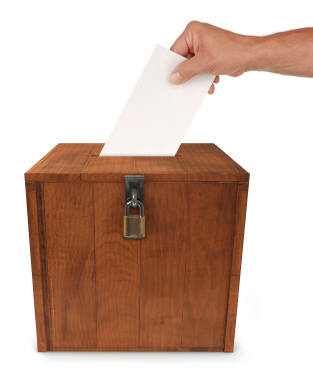
The 1730 election introduced the ballot box. With a million voters, it became impossible for the Dutch to elect a statholder through a forum.
 To compensate for this, the Republican party had gradually become more left wing, reaching their farthest by the late 1700s, while the Orange party moved much closer to a modern Republican party. This general shift left across much of Europe created a strong monarchist backlash in several regions, where the monarchy had moved to a more totalitarian stance in much of Russia, Germany and England. Anti-liberal sentiment was common in the larger cities across Europe, while within the Dutch Empire, the talk was of increasing liberties to the common people.
To compensate for this, the Republican party had gradually become more left wing, reaching their farthest by the late 1700s, while the Orange party moved much closer to a modern Republican party. This general shift left across much of Europe created a strong monarchist backlash in several regions, where the monarchy had moved to a more totalitarian stance in much of Russia, Germany and England. Anti-liberal sentiment was common in the larger cities across Europe, while within the Dutch Empire, the talk was of increasing liberties to the common people. Even in this 1730 election, the Orange party had vowed to spend far more money subsidizing the food bought by factory workers to encourage economic growth, while the Republican party had promised the formation of state funded education for all citizens below the age of eighteen who could not afford to attend a more prestigious public school.
Even in this 1730 election, the Orange party had vowed to spend far more money subsidizing the food bought by factory workers to encourage economic growth, while the Republican party had promised the formation of state funded education for all citizens below the age of eighteen who could not afford to attend a more prestigious public school.  Pivotal to the 1730 election was of course, the continued course of the war. While the continual march of conquest had kept spirits in distant Amsterdam high, the lack of progress and lack of real effort in attaining peace had prevented the general populace, especially in those cities still exposed to war, wary of the inability of the current government to end the conflict so they could move on to business and profit.
Pivotal to the 1730 election was of course, the continued course of the war. While the continual march of conquest had kept spirits in distant Amsterdam high, the lack of progress and lack of real effort in attaining peace had prevented the general populace, especially in those cities still exposed to war, wary of the inability of the current government to end the conflict so they could move on to business and profit. Leading the Republicans, and heavily favoured to win was Lord Vermeers. An honest, fairly experienced politician, he had a fair lead over his competitor, Jurgen van Buren. Jurgen van Buren was quite possibly the most talented politician of the age, but as all the best ministers had flocked to the successful Republican Party, his cabinet was severely lacking, which hurt his prospects immensely. Even though the new Republican ministers were not as talented as the current cabinet under Gravsdyke, they were still deemed competent enough to win the election.
Leading the Republicans, and heavily favoured to win was Lord Vermeers. An honest, fairly experienced politician, he had a fair lead over his competitor, Jurgen van Buren. Jurgen van Buren was quite possibly the most talented politician of the age, but as all the best ministers had flocked to the successful Republican Party, his cabinet was severely lacking, which hurt his prospects immensely. Even though the new Republican ministers were not as talented as the current cabinet under Gravsdyke, they were still deemed competent enough to win the election.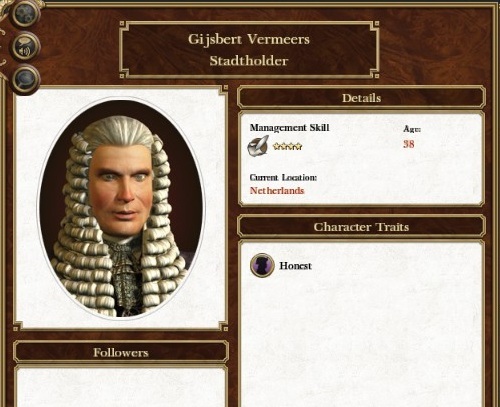
The leader of the Republican party, Lord Vermeers.
 Ultimately, what the election ran down to was part slander against the Orange party for their inability to maintain peace and profit during their term in 1720, and in the Republican’s ability to secure the vote from the majority of the factory owners that they had funded over the past decade. These two key factors swung the vote into the Republican victory.
Ultimately, what the election ran down to was part slander against the Orange party for their inability to maintain peace and profit during their term in 1720, and in the Republican’s ability to secure the vote from the majority of the factory owners that they had funded over the past decade. These two key factors swung the vote into the Republican victory. Victory in hand, Vermeers, now in control of the armies and military policy across all of the Empire, his cabinet heavily influential among the ministers of France, Spain and Germany was able to consolidate his resources into a much stronger, more single minded push. Unlike Gravesdyke however, Vermeer didn’t take the British all that seriously. Instead, he sought to dominate central Europe, knocking out Austria and forming a new border along the Mediterranean. It was possible that they’d have to fight the Polish once they had conquered Austria. An enemy of the Prussians, the Polish could possibly take offense to the proximity of the Dutch to their borders. A powerful land Empire, the Poles would be a force to be reckoned with if they decided to attack the Dutch, but conquering them in return would present more land and wealth to the United Provinces.
Victory in hand, Vermeers, now in control of the armies and military policy across all of the Empire, his cabinet heavily influential among the ministers of France, Spain and Germany was able to consolidate his resources into a much stronger, more single minded push. Unlike Gravesdyke however, Vermeer didn’t take the British all that seriously. Instead, he sought to dominate central Europe, knocking out Austria and forming a new border along the Mediterranean. It was possible that they’d have to fight the Polish once they had conquered Austria. An enemy of the Prussians, the Polish could possibly take offense to the proximity of the Dutch to their borders. A powerful land Empire, the Poles would be a force to be reckoned with if they decided to attack the Dutch, but conquering them in return would present more land and wealth to the United Provinces.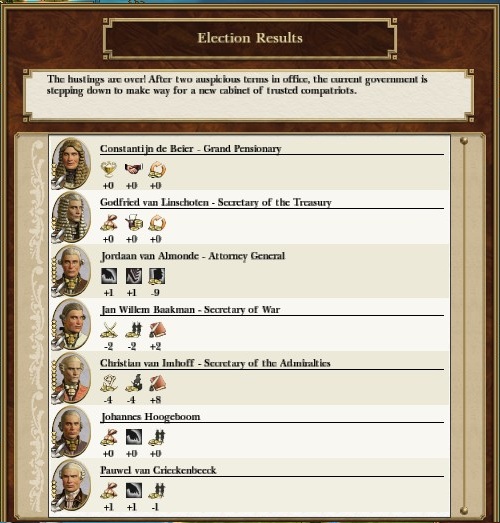
The new Dutch cabinet.
 By the time the election had ended, it was a fairly obvious thing that Vienna would fall to the Dutch. With no reinforcements forthcoming, and attrition accounting for over fifty percent of the fatalities the Austrians suffered during the siege, the Dutch army had little standing in their way in late 1731 when the Austrians finally sallied forth to try and break the Dutch blockade of food and clean water.
By the time the election had ended, it was a fairly obvious thing that Vienna would fall to the Dutch. With no reinforcements forthcoming, and attrition accounting for over fifty percent of the fatalities the Austrians suffered during the siege, the Dutch army had little standing in their way in late 1731 when the Austrians finally sallied forth to try and break the Dutch blockade of food and clean water. 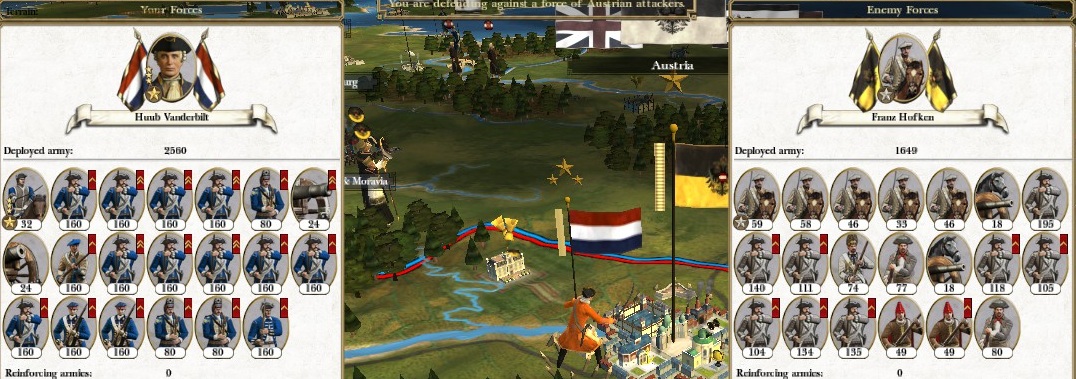
The Austrian army had wasted down to nearly half its full strength.
 Moving out over the snow under heavy artillery bombardment from the well entrenched Dutch line, the Austrians had no choice but to attempt a full frontal assault. The Dutch lines contained twice as many men as their own, and gave no chance for the Austrians to attempt to gain a flank. The battle was decisive, but under the relatively inexperienced command of Vanderbelt, the Dutch were not aggressive enough to wipe the fleeing Austrians out, letting hundreds of men escape back into their star fort.
Moving out over the snow under heavy artillery bombardment from the well entrenched Dutch line, the Austrians had no choice but to attempt a full frontal assault. The Dutch lines contained twice as many men as their own, and gave no chance for the Austrians to attempt to gain a flank. The battle was decisive, but under the relatively inexperienced command of Vanderbelt, the Dutch were not aggressive enough to wipe the fleeing Austrians out, letting hundreds of men escape back into their star fort.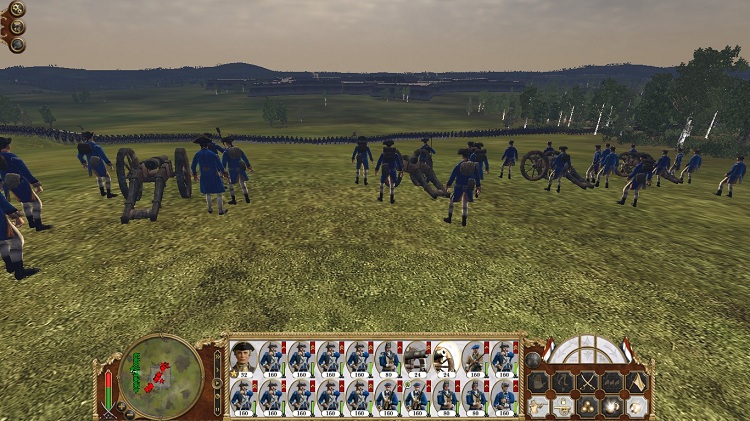
The Dutch standing over the Austrian star fort.
 Too cautious to even capitalize on the advantage of nearly five to one against the remaining garrison, Vanderbelt settled down for almost another year waiting for the Austrian surrender rather than risk his army in an assault. Reporting back to Amsterdam that the fortifications remained too expensive to take directly, he told them that it could be taken no sooner than late 1732, which was coincidentally when the comparatively expendable militia could make it to Vienna.
Too cautious to even capitalize on the advantage of nearly five to one against the remaining garrison, Vanderbelt settled down for almost another year waiting for the Austrian surrender rather than risk his army in an assault. Reporting back to Amsterdam that the fortifications remained too expensive to take directly, he told them that it could be taken no sooner than late 1732, which was coincidentally when the comparatively expendable militia could make it to Vienna. Neither the wait nor militia would be necessary however. The Austrians were forced into a last desperate charge, even though they clearly knew they could not succeed in defeating the Dutch. Their stand was well known to the Austrians, and they were often painted tragically and heroically, but the reality of it was that the majority had actually broken away into the country side.
Neither the wait nor militia would be necessary however. The Austrians were forced into a last desperate charge, even though they clearly knew they could not succeed in defeating the Dutch. Their stand was well known to the Austrians, and they were often painted tragically and heroically, but the reality of it was that the majority had actually broken away into the country side. Vienna, and the Austrian countryside was put into a state of dissent the Dutch were honestly not entirely prepared for. Unhappiness was at an all time low that exceeded that of even the French three decades prior. A rebellion was certainly on the horizon, and the Dutch had begun preparations for it immediately. Keeping their entire garrison in Vienna intact, the small army of militia bounded past them and continued on to Zagreb, the last outpost of the Austrians. Difficult and bloody battles around Zagreb killed thousands on either side, but the Austrians couldn’t lift the siege.
Vienna, and the Austrian countryside was put into a state of dissent the Dutch were honestly not entirely prepared for. Unhappiness was at an all time low that exceeded that of even the French three decades prior. A rebellion was certainly on the horizon, and the Dutch had begun preparations for it immediately. Keeping their entire garrison in Vienna intact, the small army of militia bounded past them and continued on to Zagreb, the last outpost of the Austrians. Difficult and bloody battles around Zagreb killed thousands on either side, but the Austrians couldn’t lift the siege.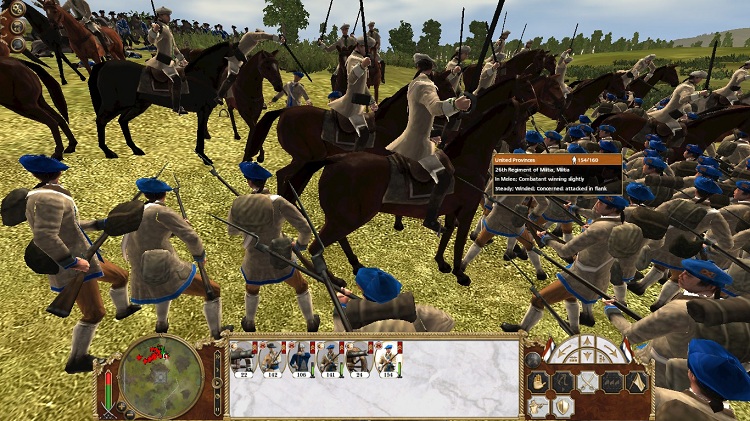
The battle of Zagreb was vicious, ill disciplined and bloody, with a wide series of melee combat.
 Meanwhile, the Dutch’ allies, the Prussians had taken their war further against the Polish, taking Gdansk from them, and moving close to reclaiming East Prussia. With Austria and Westphalia out of their way, no longer tying up their forces, the Prussians were making a comeback in a major way.
Meanwhile, the Dutch’ allies, the Prussians had taken their war further against the Polish, taking Gdansk from them, and moving close to reclaiming East Prussia. With Austria and Westphalia out of their way, no longer tying up their forces, the Prussians were making a comeback in a major way. By now, the Dutch had expanded their forces by as many men as they feasibly could. The new cabinet was not keeping their balances up to the level their predecessors had, halving the national profits each year. With only fourteen million guilders in total income every year, the Dutch government had assessed that it was now impossible to increase their armies any further. Advancing through almost all of western India, and preparing for a more general brawl across the East coast of America, the Dutch could finally stop spending billions in upkeep and recruitment in Europe.
By now, the Dutch had expanded their forces by as many men as they feasibly could. The new cabinet was not keeping their balances up to the level their predecessors had, halving the national profits each year. With only fourteen million guilders in total income every year, the Dutch government had assessed that it was now impossible to increase their armies any further. Advancing through almost all of western India, and preparing for a more general brawl across the East coast of America, the Dutch could finally stop spending billions in upkeep and recruitment in Europe. This left the American theater, which had expanded only enough to defeat the surprise assault from the British fleet in Florida, completely ill equipped to the task at hand. With the British army in Africa and the army from the channel destroyed, the British could afford to expend a ludicrous amount of money focused on the American colonies. They even paid the Iroquois Confederacy to join them in their war against the Dutch. Worried that they would suffer the same fate as the Cherokee if Dutch expansionism continued, the Iroquois were very easy to persuade.
This left the American theater, which had expanded only enough to defeat the surprise assault from the British fleet in Florida, completely ill equipped to the task at hand. With the British army in Africa and the army from the channel destroyed, the British could afford to expend a ludicrous amount of money focused on the American colonies. They even paid the Iroquois Confederacy to join them in their war against the Dutch. Worried that they would suffer the same fate as the Cherokee if Dutch expansionism continued, the Iroquois were very easy to persuade.
The Dutch were disorganized across the American theater. the British had managed to rally their forces, and the Cherokee were replaced by the Iroquois.
 With Amsterdam cutting the funds off from the American theater and the colonial army, the Americas had a potential to provide the largest losses in the war up to that point in time. It was no longer a question of how far they could advance, as much as the European politicians demanded it, nor even a question of how well they could hold out, but it became a matter of how little they would lose before the government could free up funds to assist the American colonies.
With Amsterdam cutting the funds off from the American theater and the colonial army, the Americas had a potential to provide the largest losses in the war up to that point in time. It was no longer a question of how far they could advance, as much as the European politicians demanded it, nor even a question of how well they could hold out, but it became a matter of how little they would lose before the government could free up funds to assist the American colonies. The Dutch government, while talented, had not yet managed to put their armies and nations into order. While they had been elected by a large margin, their popularity had fallen rapidly since the election. The Republican government was attempting to reign things in as best they could, but it was clear to them that if they continued on the course they were on, they would be incapable of re-election.
The Dutch government, while talented, had not yet managed to put their armies and nations into order. While they had been elected by a large margin, their popularity had fallen rapidly since the election. The Republican government was attempting to reign things in as best they could, but it was clear to them that if they continued on the course they were on, they would be incapable of re-election. Next we will be presenting traditional celebrations over the history of Hanukah. Following this, a reasoning on why both holidays fall in such a similar time period. World news has been moved back an hour for today and for the rest of the Christmas season. If you want news of the current war in the Middle East please channel in to BBC radio 1. David Stephenson will be presenting more on the 80 years war in 3 days.
Next we will be presenting traditional celebrations over the history of Hanukah. Following this, a reasoning on why both holidays fall in such a similar time period. World news has been moved back an hour for today and for the rest of the Christmas season. If you want news of the current war in the Middle East please channel in to BBC radio 1. David Stephenson will be presenting more on the 80 years war in 3 days.